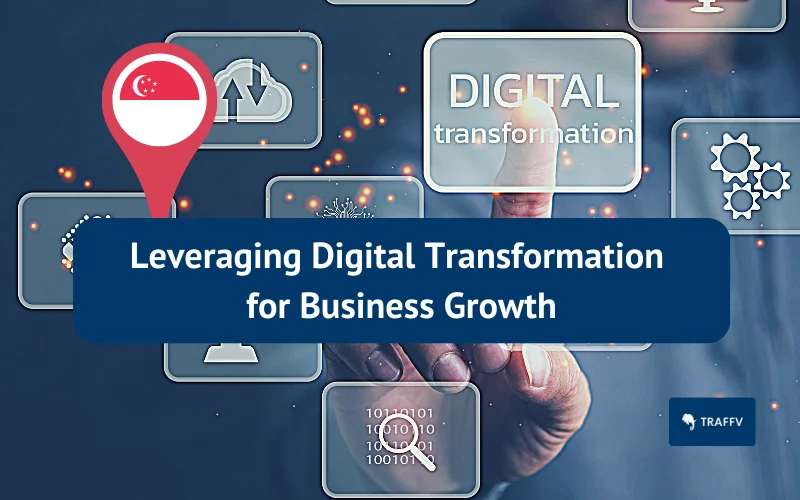Unlocking the power of digital transformation Singapore is more than just a technological upgrade; it’s a transformational journey that promises to revolutionize the way we live, work, and do business.
As we dive into the remarkable story of Singapore’s digital transformation, we invite you to discover how businesses, citizens, and the government are embracing this change, setting the stage for a more connected, innovative, and prosperous future.
TL:DR
- Singapore is committed to the Smart Nation Initiative, leveraging technology and data for business growth.
- The government provides guidance, resources and incentives to businesses for digital transformation.
- Singapore is actively investing in initiatives like SkillsFuture to prepare citizens with necessary skills for a digital future.
Embracing Singapore’s Digital Transformation Journey
Singapore’s vision of becoming a Smart Nation hinges on its ability to embrace digital transformation.
The government is determined to leverage new technologies to enhance the quality of life for citizens, generate economic growth, and foster a connected society.
With the Smart Nation Initiative at its core and government agencies playing a crucial role in driving digital transformation, Singapore is setting the stage for a digital future that benefits everyone.
Key strategies for digital transformation in Singapore include increasing digital access, literacy, SEO transformations for businesses, and participation among Singaporeans to promote economic growth, as well as integrating technology into various business aspects to create or modify existing workflows, processes, strategies, culture, or customer experiences.
Notable digital transformation initiatives implemented by Singaporean businesses, such as DBS Bank and Singtel, showcase the successful adoption of new business strategies.
Readying the workforce for a digital future is also of great importance, ensuring that Singaporeans are equipped with the requisite abilities and understanding to succeed in the digital economy.
To address the digital divide, initiatives like digital inclusion programs and the promotion of hybrid work models are being implemented.
The Smart Nation Initiative
The Smart Nation Initiative is a government-led endeavor that aims to utilize technology and data to transform Singapore into a highly connected and technologically advanced nation, fostering business growth.
Comprised of three core components—digital economy, digital government, and digital society—the initiative focuses on five primary domains.
- Transport
- Urban living
- Finance
- Education
- Health
All of these domains benefit from the use of digital tools.
By transforming Singapore into a technology-driven society, the Smart Nation Initiative aims to enhance every aspect of life, making it more efficient and convenient for citizens, businesses, and the government alike.
Through the implementation of cutting-edge technologies, data-driven solutions, and innovative policies, the initiative seeks to create a seamless and interconnected system that can effectively address the challenges and capitalize on the opportunities of the digital age.
The Role of Government Agencies
Government agencies, such as IMDA and GovTech, are tasked with the implementation of digital transformation strategies and initiatives across various sectors.
These agencies play a crucial role in shaping Singapore’s digital future by establishing capability centers in areas like:
- Application Design, Development & Deployment
- Cybersecurity
- Data Science
- Artificial Intelligence
The Application Design, Development & Deployment center facilitates the delivery of citizen-centric government digital services that support public sector digital transformation.
Meanwhile, the Cybersecurity center focuses on:
- Creating a comprehensive set of cybersecurity capabilities to detect and counter cyber threats
- Identifying vulnerabilities in government ICT and smart systems
- Establishing secure architectures
- Offering cybersecurity governance and technical advice.
Together, these agencies and centers help create a secure and thriving digital ecosystem for Singapore’s Smart Nation vision.
Key Strategies for Digital Transformation in Singapore
Singapore is actively promoting the adoption of digital technologies by businesses and strengthening its digital infrastructure to support its digital transformation objectives.
By providing guidance, resources, and incentives, the government encourages companies to develop a comprehensive digital transformation strategy that takes into account their internal capacities, software solutions, and financial resources.
The focus of SG:Digital for Companies is to transform businesses and enable growth through digitalization. To achieve this, it is suggested that businesses:
- Construct a digital transformation roadmap with a timeline and essential milestones.
- Establish a clear, actionable strategy (such as using Google ads or SEO in Singapore).
- Effectively navigate the digital landscape.
- Capitalize on the opportunities it presents.
By following this business strategy, companies can transform their business models and achieve growth through digitalization.
From enhancing customer experiences to streamlining operations and driving innovation, digital transformation is essential for businesses to stay competitive in today’s fast-paced, technology-driven world.
Encouraging Business Adoption of Digital Technologies
The government provides support and incentives to businesses for the adoption of digital technologies, such as e-invoicing and e-payments, to enhance efficiency and competitiveness.
The e-invoicing scheme launched in Singapore in 2019 is a system that completely automates the exchange and processing of payment requests between buyers and suppliers.
This framework facilitates faster transactions, lowers operating costs, and minimizes errors, making it an attractive option for businesses looking to streamline their processes.
By fostering the adoption of such digital technologies, the government is paving the way for a more robust and agile business landscape, capable of adapting to the ever-evolving demands of the digital age.
Enhancing Digital Infrastructure
Singapore has invested in improving its digital infrastructure, such as high-speed internet connectivity, cloud services, and data centers, to support the digital economy.
By investing ahead of demand, holistically planning for the entire digital infrastructure stack, and strengthening the digital infrastructure stack to include hard, physical, digital, and soft infrastructure, Singapore is creating a robust foundation for its digital transformation.
These investments not only support the digital economy, but also contribute to the overall success of the Smart Nation Initiative, ensuring that Singapore remains at the forefront of technological innovation.
Success Stories: Digital Transformation in Singaporean Businesses
Notable examples of successful digital transformation in Singapore include DBS Bank and Singtel, who have implemented innovative strategies and set the standard for other businesses to follow.
These success stories demonstrate the power of digital transformation in driving business growth, customer satisfaction, and operational efficiency.
They also serve as a testament to Singapore’s commitment to fostering a thriving digital ecosystem, where businesses can excel and compete on a global scale.
By embracing digital transformation and adapting to the ever-changing technological landscape, businesses like DBS Bank and Singtel have managed to stay ahead of the curve, carving a path for others to follow.
These success stories serve as an inspiration and a reminder of the immense potential that lies in harnessing the power of digital transformation.
DBS Bank
DBS Bank has achieved remarkable success through its innovative approach to digital transformation, its commitment to customer satisfaction, and its philosophy of “technology is business and business is technology”.
As a result, DBS has become the world’s first bank to simultaneously hold three global best bank honors. By successfully implementing technology to enhance customer experience, streamline operations, and foster innovation, DBS has emerged as a leading digital bank in Asia.
This accomplishment showcases the power of digital transformation in driving business growth and customer satisfaction.
By leveraging technology and embracing change, DBS Bank has managed to stay ahead of the competition and establish itself as a frontrunner in the digital banking landscape.
Singtel
Singtel is renowned for being one of the leading telecommunications companies in Asia, offering a broad range of digital and telecommunication services to both consumers and businesses.
With its roots in Singapore since the late 19th century, Singtel has further expanded its operations worldwide through strategic investments and acquisitions.
To remain competitive in the digital age, Singtel has adapted its business model by providing digital services, including mobile payments and cybersecurity solutions.
By diversifying its offerings and embracing digital transformation, Singtel has managed to stay ahead of the curve, ensuring its continued success in an increasingly digital world.
Preparing the Workforce for a Digital Future
It is essential for Singapore to focus on upskilling its workforce to ensure that citizens are equipped with the necessary skills and knowledge to thrive in the digital economy.
Through initiatives like SkillsFuture and providing support for public officers, the government is actively working to foster a culture of lifelong learning and skills development that prepares individuals for the challenges and opportunities of the digital age.
By investing in the development of its human capital, Singapore is not only building a strong foundation for its digital transformation journey, but also creating a more resilient, adaptable, and competitive workforce that can drive the nation’s success in the global digital economy.
SkillsFuture Initiative
The SkillsFuture Initiative is a national movement in Singapore that aims to promote lifelong learning and skills development.
Introduced in 2015, this initiative seeks to build a culture of skills development and provide Singaporeans with opportunities to develop their fullest potential throughout life.
Offering a variety of programs and initiatives, such as:
- SkillsFuture Credit
- SkillsFuture Earn and Learn Program
- SkillsFuture Mid-Career Enhanced Subsidy
- SkillsFuture Study Awards
The initiative supports Singaporeans in enhancing their skills and knowledge.
By fostering a culture of lifelong learning, SkillsFuture has had a beneficial influence on Singapore’s economy and labor force, facilitating the development of a more skilled and productive labor force, and equipping Singaporeans to remain competitive in the digital economy.
Supporting Public Officers
The government recognizes the importance of supporting public officers in their digital transformation journey and provides training, resources, and opportunities for collaboration and innovation to help them adapt and excel in their roles.
By upskilling and reskilling public officers, the government ensures that its workforce is well-equipped to navigate the challenges and harness the opportunities presented by digital transformation.
This support not only empowers public officers to better serve the citizens of Singapore, but also contributes to the overall success of the nation’s digital transformation journey.
As the government and public sector continue to embrace digital transformation, the investment in the development of its workforce will pay dividends in the form of a more efficient, innovative, and responsive public service.
Overcoming the Digital Divide
The digital divide is a pressing concern for Singapore, as it represents the disparity between individuals with access to digital technologies and those without.
To bridge this gap, the government has implemented various digital inclusion programs and promoted hybrid work models that ensure no one is left behind in the digital transformation journey.
By addressing the digital divide, Singapore is taking a proactive approach to ensure that all citizens can benefit from the opportunities presented by digital transformation.
This commitment to leaving no one behind is a testament to the nation’s dedication to building an inclusive, connected, and prosperous society for all.
Digital Inclusion Programs
Digital inclusion programs in Singapore include:
- DigitalAccess@Home scheme: provides subsidized broadband
- Digital4Good program: enhances digital literacy and reduces the digital divide
- Silver Infocomm Initiative: provides digital skills and technology access to seniors and other vulnerable groups.
These initiatives have had a beneficial effect on Singapore, aiding in the reduction of the digital divide and augmenting digital literacy.
By ensuring that all citizens, regardless of age or background, have access to technology and the skills to use it effectively, Singapore is fostering a more inclusive and connected society.
Promoting Hybrid Work Models
The government promotes the adoption of hybrid work models, which integrate remote and in-office work, to enable all employees to benefit from digital transformation.
By encouraging businesses to establish clear policies, set expectations, and provide support for hybrid working teams, the government helps create a more inclusive and flexible work environment that caters to the diverse needs of its workforce.
The promotion of hybrid work models offers several benefits.
- Empowers employees to take advantage of digital transformation
- Creates a more resilient and adaptable workforce
- Ensures that all employees can thrive in the digital age, regardless of their individual circumstances
By embracing this approach, Singapore is taking a proactive step towards building a future-ready workforce.
Singapore’s Digital Transformation
Singapore’s digital transformation journey is a testament to the nation’s commitment to harnessing the power of technology for the benefit of its citizens, businesses, and the economy.
Through the Smart Nation Initiative, government support for businesses and public officers, digital inclusion programs, and the promotion of hybrid work models, Singapore is building a strong foundation for a more connected, innovative, and prosperous future.
As we embrace the opportunities and challenges of the digital age, let us take inspiration from Singapore’s success and strive to unlock the full potential of digital transformation in our own lives and communities.
Frequently Asked Questions
What is an example of digital transformation in Singapore?
Singapore has embraced digital transformation, for example by launching the FAST payment system in 2014 to enable real-time transfers of funds across different banking institutions.
Furthermore, small physical shops can benefit from having an online shopfront alongside their physical location, allowing for more customer communication through platforms such as Live Chat and Whatsapp.
What are the 4 main areas of digital transformation?
Digital transformation initiatives typically focus on four main areas: customer experience, operational process optimization, data-driven decision making and agility.
By leveraging these areas, companies can harness the power of digital technology to boost their performance.
What is digitalisation in Singapore?
Digitalisation in Singapore is spearheaded by the SG Digital Office SDO to support individuals and businesses with digital tools and skills in order to thrive in an increasingly digitalised world.
The SDO provides a range of initiatives to help Singaporeans and businesses become more digitally savvy, such as the Digital Readiness Blueprint, the Digital Resilience Initiative, and the Digital Skills Framework. These initiatives are designed to equip Singaporeans with the necessary knowledge.
What is the Smart Nation Initiative?
The Smart Nation Initiative is a government-led initiative that harnesses the power of technology and data to create a more connected and advanced Singapore, driving business growth.
It is designed to enable citizens to access services more easily, and to create a more efficient and secure environment for businesses to operate in. It also seeks to create a more sustainable and inclusive society, by leveraging technology to improve the lives of citizens.




